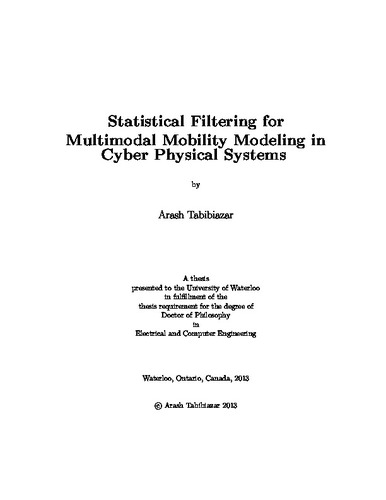| dc.description.abstract | A Cyber-Physical System integrates computations and dynamics of physical processes. It is an engineering discipline focused on technology with a strong foundation in mathematical abstractions. It shares many of these abstractions with engineering and computer science, but still requires adaptation to suit the dynamics of the physical world.
In such a dynamic system, mobility management is one of the key issues against developing a new service. For example, in the study of a new mobile network, it is necessary to simulate and evaluate a protocol before deployment in the system. Mobility models characterize mobile agent movement patterns. On the other hand, they describe the conditions of the mobile services.
The focus of this thesis is on mobility modeling in cyber-physical systems. A macroscopic model that captures the mobility of individuals (people and vehicles) can facilitate an unlimited number of applications. One fundamental and obvious example is traffic profiling. Mobility in most systems is a dynamic process and small non-linearities can lead to substantial errors in the model.
Extensive research activities on statistical inference and filtering methods for data modeling in cyber-physical systems exist. In this thesis, several methods are employed for multimodal data fusion, localization and traffic modeling. A novel energy-aware sparse signal processing method is presented to process massive sensory data.
At baseline, this research examines the application of statistical filters for mobility modeling and assessing the difficulties faced in fusing massive multi-modal sensory data. A statistical framework is developed to apply proposed methods on available measurements in cyber-physical systems. The proposed methods have employed various statistical filtering schemes (i.e., compressive sensing, particle filtering and kernel-based optimization) and applied them to multimodal data sets, acquired from intelligent transportation systems, wireless local area networks, cellular networks and air quality monitoring systems. Experimental results show the capability of these proposed methods in processing multimodal sensory data. It provides a macroscopic mobility model of mobile agents in an energy efficient way using inconsistent measurements. | en |

